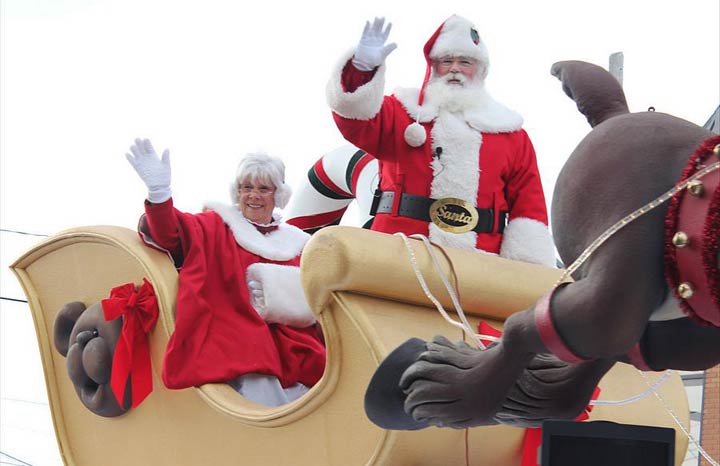Saint Nick is apparently not having his best year.

According to a newly released poll conducted by Ipsos on behalf of Global News between Dec. 15 and Dec. 21, Santa is suffering from a dwindling approval rating as Canadians head into their Christmas holidays.
While 76 per cent of respondents aged 18 or over ‘approve’ (41 per cent strongly/36 per cent somewhat) of Santa’s performance in 2016, that’s actually down slightly from the 78 per cent who approved of his work in 2015.
“It’s been a tough year all around,” said Sean Simpson, vice president of Ipsos Public Affairs. “People might be taking out their frustrations on Santa a little bit.”
WATCH: MPs read the holiday classic ‘Yes, Virginia, there is a Santa Claus’

Simpson added that over the years, he’s noticed that Santa’s approval rating seems tied to other factors.
In 2005, for instance, the Canadian economy was faring pretty well, but Santa found himself with an all-time low approval rating of 70 per cent. When the economy is in the dumps, Santa makes a comeback.
So, as perceptions of how Canada is doing economically have improved over the last year, his fortunes have worsened.
“Maybe it’s that people are more appreciative of Santa Claus and what he does in times of challenge, economic challenge,” Simpson speculated.
Most approving of Santa’s job performance this year were Atlantic Canadians (82 per cent), followed by those in Ontario (79 per cent), Alberta (78 per cent), Saskatchewan and Manitoba (78 per cent), British Columbia (75 per cent) and finally Quebec (70 per cent).
Traditions on the wane
Meanwhile, fewer Canadians are decking the halls and hanging their stockings by the chimney with care, the poll indicates, as time-honoured Christmas traditions are either replaced or completely discarded.
The proportion of Canadians exchanging gifts at Christmas dropped from 80 per cent in 2014 to 75 per cent in 2016. The number who say they’ll have a Christmas tree has plummeted eight percentage points (78 per to 70 per cent) since 2010, and the number having turkey for Christmas dinner is down 10 points in the same span (75 per cent to 65 per cent).
READ MORE: 1 in 4 Canadians admit to driving drunk, half think limit is too low
A little under half will be hanging stockings (down seven points since 2010), and only a quarter plan to attend church (down three points since 2010). Nearly one in 10 Canadians say they won’t do any of these things.
“It has to do with the changing landscape of Canada,” explained Simpson.
“These traditions are rooted not only in Christianity, but really the English, German, Western European tradition of what Christmas is and what it’s all about. As Canada becomes more diverse, as we become increasingly a land of immigrants, as the origin of those immigrants shifts … it’s not surprising that the proportion of people that observe these traditions is decreasing.”
WATCH: Children from Syria enjoy first taste of Christmas turkey

Of course, there are still plenty of holdouts when it comes to Christmas traditions. Almost across the board, Atlantic Canadians are most likely to observe them, and women are more likely than men to cling to them.
Perhaps unsurprisingly, baby boomers also tend to have a higher incidence of adhering to the Christmas traditions of the past, while millennials are more likely to eschew them.
“It all comes down to demographics,” Simpson said. “There’s every expectation that this change, this evolution of Canada, will continue.”
- Life in the forest: How Stanley Park’s longest resident survived a changing landscape
- ‘Love at first sight’: Snow leopard at Toronto Zoo pregnant for 1st time
- Carbon rebate labelling in bank deposits fuelling confusion, minister says
- Buzz kill? Gen Z less interested in coffee than older Canadians, survey shows
‘Happy Holidays’ or ‘Merry Christmas’?
The number of Canadians who believe that “we should refer to the end of the year as the Christmas Season because that is the original meaning and purpose of the holiday” is down this year, but only slightly. That view is still held by two out of three of us (68 per cent).
The other third of poll respondents agrees that “we should refer to the end of the year as the Holiday Season because not everyone celebrates Christmas and it’s important to be inclusive of other religions and cultures.” The younger you are, the more likely you are to be in that group.
This poll was conducted between Dec. 15 and Dec. 21, 2016, with a sample of 3,004 Canadians from Ipsos’ online panel who were interviewed online. In this case, the poll is accurate to within +/ – 3.5 percentage points, 19 times out of 20, had all Canadian adults been polled. All sample surveys and polls may be subject to other sources of error, including, but not limited to coverage error, and measurement error.


Comments